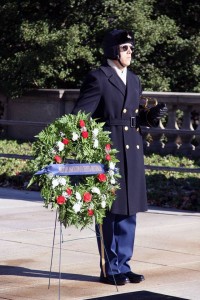Solemn Display Nontheists Welcomed at the Tomb of the Unknown Soldier
 Photo courtesy of MAAF
Photo courtesy of MAAF On the morning of Pearl Harbor Day, December 7, 2014, I joined the Military Association of Atheists and Freethinkers (MAAF) in laying a wreath at the Tomb of the Unknown Soldier in Arlington National Cemetery. Before we were allowed to approach the tomb with our wreath, the Sergeant of the Guard clearly and loudly announced to the large crowd that the wreath was sponsored by the Military Association of Atheists and Freethinkers: no flinching, no muffled words, no hurry through the title, but loud and clear for all to hear. As we descended the steps towards the wreath and tomb, I immediately noted that nobody was leaving in droves and no heckling or rude comments like “Oxymoron!” emanated from the crowd. There were no trolls tweeting derisory comments like “There are no atheists in foxholes,” nor did people accuse us of being unpatriotic or un-American. Certainly, nobody told us we had no right to live in America. All that a person could hear during this somber occasion was the sound of the well-trained sentry as he made his precision steps to guard the tomb.
It was my privilege to lay the wreath alongside Army Major Ryan Jean, a current-standing officer in the U.S. Army reserve, and a former applicant to become a humanist lay leader in the Army. (People like Major Jean and Army Major Raymond Bradley have struggled for humanists to be afforded equal treatment in the U.S. military, and have recently won the opportunity for soldiers in the Army to self-identify as humanists and to have this designation on their official records.) It was also a memorable occasion for Major Jean who recalled the importance of the place: “The Tomb of the Unknown Soldier is America’s most revered monument to those who, as President Lincoln once said, gave the ‘last full measure of devotion’ to their country. The wreath-laying tribute gave a chance for us to show that nontheists care equally and deeply about the sacrifices made by so many. The soldiers, sailors, airmen, and Marines buried here at Arlington and honored profoundly at this tomb didn’t fight for a Christian nation, but for a free one, where the hearts of women and men could be guided by their own conscience to believe as they will—or not believe at all—and still be seen as equals.”
Leading up to the event I sought out the perspective of another current-standing humanist in the military. Chief Petty Officer Doug Wright has received seventeen decorations, having given twenty-one years of dedicated service to the nation in the U.S. Navy, including tours of duty on five vessels. Chief Wright is also a humanist leader and he highlighted similar concerns for nontheists in the military: “Self-identifying as a humanist is important because it creates opportunities for both visibility and normalcy. There are a lot of misconceptions about what humanism is all about, many of them less than flattering.” Wright also stated that “simply living our lives in accordance with the tenets of humanism sends a powerful, positive message to others who may be misinformed about us. That applies not just with the military, but with all facets of American society. Hiding deeply held beliefs should never be a situation Americans have to tolerate.”
There can be no doubt that self-representation and identification is a vital issue within the military. At the congressional hearing on religious accommodation in the military held last month, Representative Dr. John Fleming (R-LA) quoted from a 2009 study and said that the composition of the military is “4 percent humanist—the closest it came to atheist.” What Fleming didn’t clarify was that currently, only the Army and the Veterans Administration allow people the right to self-identify as humanist, and that the 4 percent he quoted isn’t a true reflection of nontheists in the military, or society at large for that matter. Can you imagine what the percentages would look like if all other branches of the service would be allowed this equal right? I can because I saw it for myself atop the steps to the tomb memorial: a multi-belief society—united as Americans—peacefully assembled together to show respect for women and men who are serving and honoring those who sacrificed their lives in defense of a free country.
